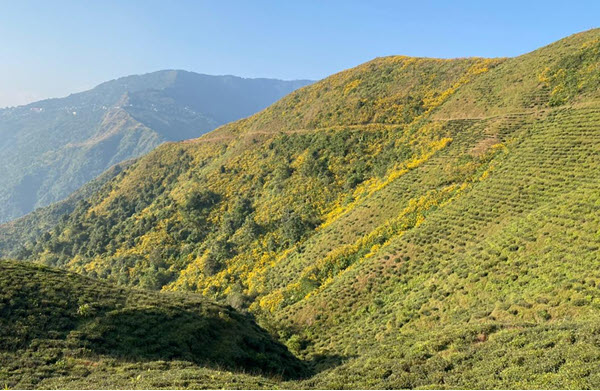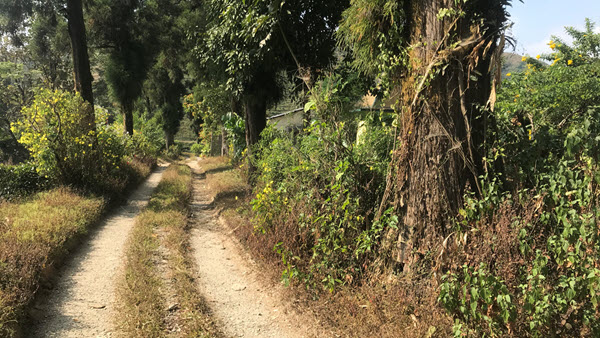Tea Biz Podcast | Episode 25
| Logistics Companies Invest to Right the Ship
| Kenya’s Newly Elected KTDA Board Ousts Executives
| Hain Celestial Streamlines its Tea Selections
Hear the Headlines
A special auction conducted by the Tea Board of India across auction centers featured a carefully curated catalog of teas plucked on International Tea Day on 21st May. This special sale saw record prices that brought welcome energy and excitement to the industry. Read more…
Features
Tea Biz this week travels to Darjeeling, India, where Dorje Tea, an innovative new tea venture, is taking root at the Agarwal family’s ancestral farm at Selim Hill Tea Garden … and then to the Jersey Isles off the coast of France, where Alicia Gentili, project manager and tea maker at Jersey Fine Tea, discusses the challenges and rewards of establishing a new tea garden in the English Channel.

Reviving Darjeeling
By Aravinda Anantharaman
Sparsh Agarwal is the fourth generation in his family to cultivate tea in the Himalayas, but, as you will hear, he is not bound by tradition. Agarwal and Dorje Tea co-founder Ishaan Kanoria are targeting India’s domestic market, offering a subscription model that delivers Darjeeling tea from all four plucking seasons, improving profitability and giving Selim Hill Tea Garden a second chance. Read more…

Splendid Tea from the Isle of Jersey
By Dananjaya Silva | PMD Silva
Camellia sinensis is a versatile plant grown in many parts of the world, observes Tea Biz correspondent Dananjaya Silva. At 49 degrees latitude, Jersey, the largest Channel Islands between England and France, is much further north than traditional tea lands. Yet, the island is proving fertile ground to produce fine loose-leaf tea. Silva talks about the challenges of growing tea outside its comfort zone with project manager and maker Alicia Gentili from Jersey Fine Tea. Read more…

Logistics Companies Invest to Right the Ship
By Dan Bolton
Shortages of raw ingredients for beverages and higher shipping costs continue the supply chain woes into summer. Last week, Starbucks’ customers found green tea in short supply, chai tea bags, and oat milk. No single item has disappeared from the menu, but Reuters found temporary shortages at nine major fast-service chains are widespread.
Less obvious are the costs passed along due to more expensive air and sea transport and a shortage of truckers. According to the Drewry Freight Rate Index, reserving a 40-foot container to ship tea from Shanghai to Los Angeles cost $6,368 in June. Delivery to Chicago from Shanghai normally takes 35 days (including 33 at sea) but shippers now estimate 73 days for delivery as port-to-destination times have doubled. When premiums are added to secure equipment and vessel space is included, the effective West Coast rate for landing tea from China is about $8,000 to $11,000 per FEU (forty-foot equivalent unit), according to the Journal of Commerce.
At the consumer level, online orders for tea must now meet $50 and $75 thresholds to qualify for free shipping, and four-week delays are common. Observers predict that the kinks in the supply chain will persist through 2022.
Biz Insight – Global container fleets are consolidating as shipping companies spend new-found money acquiring vessels and ordering containers. Swiss-owned MSC (Mediterranean Shipping Company) has acquired 70 ships since August and has an order book of 800,000 TEU for new ships. The buildup in demand shows no sign of abating as consumers spend pandemic savings and economies emerge from lockdowns.

Newly Elected KTDA Board Ousts Executives
Newly elected Kenya Tea Development Agency (KTDA) directors and chairman David Muni Ichoho on June 22 were escorted by police to their offices in the KTDA headquarters in Nairobi.
KTDA’s Peter Kanyago, who had been at the helm of the tea agency for 26 years, was forced to relinquish his position after he was unseated in a local election April 25. KTDA CEO Lerionka Tiampati and other senior staff were given compulsory leave. Ichoho announced an internal investigation to determine culpability for potential malpractice and possible abuse of office.
Kenya’s tea farmers collectively own 66 of the nation’s tea factories. They contract with the Kenya Tea Development Agency (KTDA) to pay for what they produce and to market their tea.
During the past two years local concerns about a ‘tea cartel’ and a new administration in Nairobi led to legislative reforms that permit factories to replace directors by conducting special elections. The previous system awarded votes by share. Board members found they only had to please the largest farmers. Now it’s one man, one vote. Ousted board members challenged the Tea Act, 2021 in court and consider any special elections conducted between March and May invalid.
Ichoho’s first official act was to notify the organization to accord full recognition and cooperation to the new board as it takes over factory management, “We wish to assure all stakeholders that the operations of the group are running smoothly without any interruptions.”
He told the Kenya News Agency that “Procurement contracts will also be reviewed to ascertain value for money and determine if the services and goods were obtained within the market benchmarks.”
“The reform journey began in earnest on 14th January 2020, with the directives by His Excellency the President of the Republic of Kenya, following outcry by over 658,000 farmers over dwindling fortunes as it became clear that the tea value chain governance structures had been captured by some individuals and groups of persons for their own selfish interests at the expense of the principal stakeholders – the tea farmers,” said Ichoho.
He said KTDA abdicated their core responsibility of serving the best interests of the farmers.
“It is against this background that shareholders made a decision to exercise their rights to make leadership changes with a view to charting a new direction towards a sustainable and profitable farming in tea sub-sector for smallholders. The farmers, towards this objective undertook to elect new leaders from the shareholders as Factory Directors and Board members for the KTDA Holdings,” Ichoho said.
A spokesperson at a non-violent late-night protest predicted that a case before Kenya’s Constitutional Court would find the government’s actions unconstitutional and reinstate the old board.
Ichoho said that all cases brought by or that have been filed by KTDA challenging the Crops Industry Regulations, 2020, and the Tea Act, 2021 will be discontinued with immediate effect.
“The Company will support full implementation of the Tea Act 2020 and will no longer pursue avenues that are against the interest of over 600,000 small holder farmers,” according to the Kenya News Agency report.
On June 18, 2021 KTDA elected the following: David Muni Ichoho as chairperson with board members, Michael Kamau Ngatia, Paul Mwangi Kagema, Enos Njiru Njeru, John Mithamo Wasusana, Geoffrey Chege Kirundi, Abungana Khasiani, Erick Kipeyegon Chepkwony, Thaddeus Mose Mangenya, James Ombasa Omweno, Wesley Cheruiyot Koech and Baptista Muriki Kanyaru.
Patrick Ngunjiri was appointed Acting Company Secretary.

Hain Celestial Simplifies Tea Selections
US grocery stores enjoyed a strong 2020 and in 2021 pandemic stickiness is apparent for e-commerce convenience and at-home meals, according to Coresite Research which reports that as of June US retail store closures are down year-over-year for the first time since the initial lockdowns.
Half of Americans now say they would feel “very comfortable” shopping in a physical store during the next three months, compared to 29% in the year-ago period according to SafetyCulture. When they return, consumers will discover that higher ingredient costs, packaging, shipping expense and eroding brand loyalty convinced food manufacturers to simplify their offerings.
General Mills anticipates raising its prices 7% globally over the next year. “We are ending one period of significant consumer disruption only to start another,” Chief Executive Jeff Harmening told the Wall Street Journal. “The next few months will be especially critical for our brands as the world transitions to a new normal.”
Tea manufacturer Hain Celestial has a big footprint in grocery with thousands of SKU (stock-keeping units) – far too many according to Mark L. Schiller, president and chief executive officer. Schiller told investors that shedding 20 brands, discontinuing 1,000 SKUs proactively before the pandemic and really simplifying the way we operate …” were the cornerstones of a simplification strategy that has increased margins.
He told Food Business News that he is transitioning the $2 billion Hain Celestial Group from a holding company to an operating company. The new focus is on innovation vs. additional flavor varieties, he said.
“So, instead of ‘here’s the 37th flavor of Sleepytime tea,’ ” he said, “we’re bringing tea with energy, tea with melatonin, tea with probiotics and gut health and immunity and things that are much more incremental in the category, cold brew tea, K-cups, things that really are going to help the retailer grow their category and therefore, earn their space.”
Share this episode with your friends in tea.
Subscribe and receive Tea Biz weekly in your inbox.











